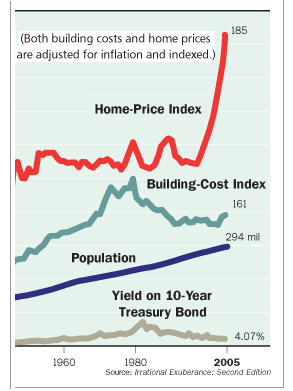

|
| weblog/wEssays | home | |
|
The Housing Conundrum (February 18, 2006)  The headlines blare that the housing boom is still full speed ahead:
Housing Construction Soars in January at Quickest Pace in 30 Years:
The headlines blare that the housing boom is still full speed ahead:
Housing Construction Soars in January at Quickest Pace in 30 Years:
Some economists, however, said that a 6.8 percent rise last month in building permits, which are not affected by the weather, could be a signal that housing activity will not slow as much this year as previously thought as long as mortgage rates do not rise too quickly.That's nice, especially coming from a mortgage broker, but does anyone else wonder if the rapidly increasing supply might finally get ahead of demand? Or what if demand is slipping just as supply is dramatically increasing? Here in the Bay Area, demand is visibly falling, as reported in the S.F. Chronicle of February 18: Home Sales Falter -- Hints Of A Slowdown. This dynamic is the heart of capitalism: high demand and fat profits attract more producers and more production, eventually meeting demand. In theory, a balance is magically achieved; in practice, supply typically overshoots demand. When this happens, prices drop as demand withers. Then, as supply continues to flood the market, prices plummet as producers try to cut their losses by dumping inventory. If you're dumping a 100,000 laptop PCs, then you're not in too much trouble. Worldwide demand soaks up 40 million PCs a year, so you'll have little problem finding buyers at a bargain price point. But a house or condo is not a PC. People don't buy one every three years, and when they do buy, they typically sell the house they already own, maintaining the inventory of unsold houses. As we know, housing is exquisitely sensitive to the cost of money in a way that PCs are not; even a modest rise in interest rates will change a lot of minds. And why would interest rates rise? How about because inflation is rising at the producer level? Core Producer Prices Rose By 0.4% During January, reports the Wall Street Journal, which works out to an annual rate of 5%. How long do you reckon mortgages can stay ay 6% if wholesale inflation is running at 5%? Short answer: they can't. Unlike a PC, whose components can be grabbed off the shelf and slapped together in a few minutes, a house takes a long time to plan and build, and carrying an inventory of unsold houses is terribly expensive. So the soaring rate of new construction may not be something to cheer. If supply far outstrips demand, prices will fall. The greater the imbalance, the farther prices will fall. Builders starting all these new homes may rue the day they pulled all those permits and committed themselves to the loans. Time will tell. * * * copyright © 2006 Charles Hugh Smith. All rights reserved in all media. I would be honored if you linked this wEssay to your site, or printed a copy for your own use. * * * |
||
| weblog/wEssays | home |